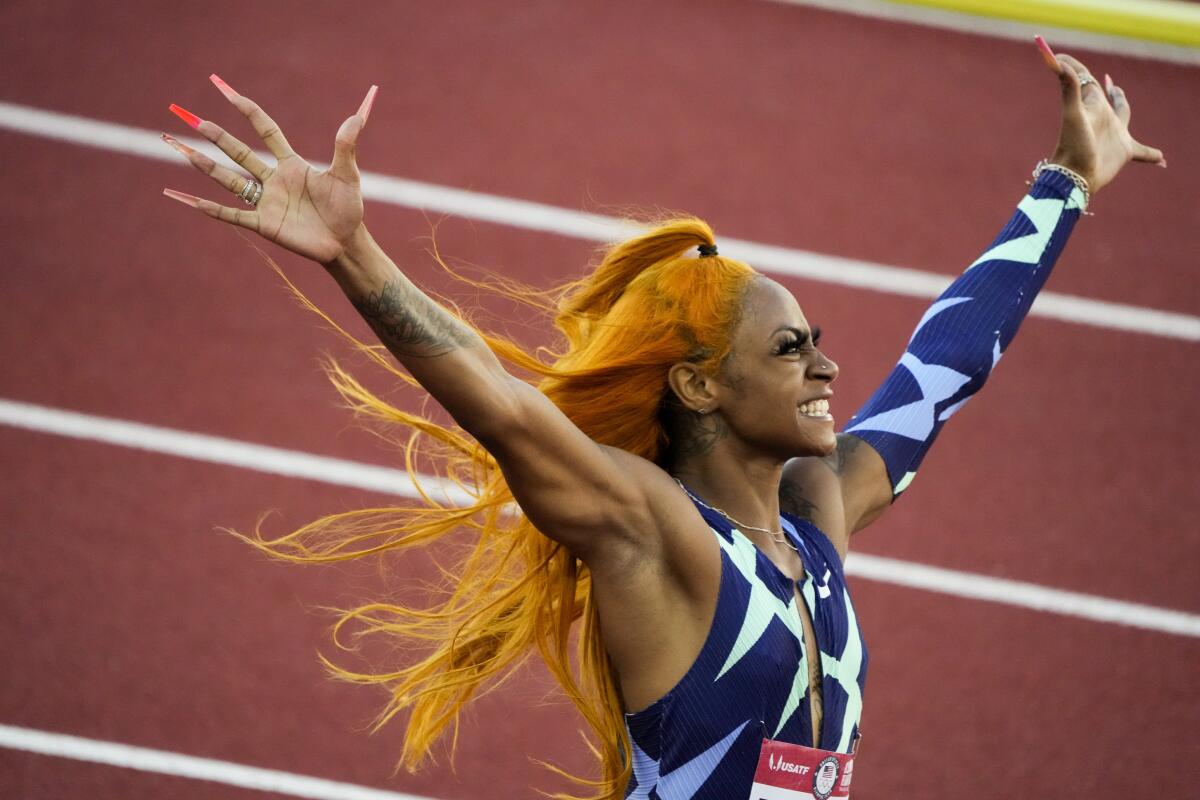Sha’Carri Richardson Olympic ban: Why is marijuana still prohibited?

- Share via
When anti-doping officials notified Sha’Carri Richardson that she had tested positive for marijuana — effectively banning her from the 100 meters at the Tokyo Olympics — the American sprinter with the fiery hair and electrifying speed offered a simple, subdued comment.
“I am human,” Richardson posted on social media.
The ensuing 24 hours have seen a far louder, if not angrier, response from around the sports world, with people asking why authorities still consider marijuana a prohibited substance.
Olympic great Michael Johnson expressed his concern on Twitter, as did Kansas City Chiefs quarterback Patrick Mahomes, who wrote: “This is so trash man … just let her run!”
The medical research community has had a similar reaction.
“I’m surprised they’re even checking for cannabis anymore,” said Dr. Mark Wallace, a UC San Diego professor who studies therapeutic use and pain management. “I guess they are looking for performance-enhancing drugs, which THC is not.”
The issue surrounding Richardson’s one-month suspension is complicated, encompassing societal mores, a web of sports organizations and intersecting regulations.
It was only two weeks ago that the Texas native prompted comparisons to Florence Griffith Joyner when she won the 100 meters in 10.86 seconds at the U.S. Olympic trials. Fans were drawn to her brightly colored hair, audaciously long nails and the emotional way the 21-year-old scrambled into the stands to hug her grandmother after the race.
There was another aspect to her story — she had learned shortly beforehand about the death of her biological mother. Richardson now says she turned to marijuana to help ease her pain.
A post-race urine test detected too much THC, the main psychoactive constituent of marijuana, in her system.
The standards are set by the World Anti-Doping Agency and, in the case of American athletes, enforced by U.S. Anti-Doping Agency. USADA announced that its three-month penalty would be reduced by two-thirds because Richardson agreed to complete a substance abuse treatment program.
The ban will expire three days before the first 100-meter heats in Tokyo on July 30, but there is a problem. Richardson’s victory at the trials was annulled so, under U.S. Track & Field rules, she did not qualify for one of the team’s three spots. Fourth-place finisher Jenna Prandini is expected to take her place.
USATF officials have the option of naming Richardson to the 100-meter relay team but did not seem willing to make an exception for the individual event.
“Sha’Carri Richardson’s situation is incredibly unfortunate and devastating for everyone involved,” the national governing body said in a statement.
As for the larger picture, recreational drugs have been at the center of a long-running debate in the anti-doping world.
As the governing body worldwide, WADA classifies a substance as prohibited if it satisfies two of three criteria: Does it pose a potential health risk? Does it enhance performance? Does it violate the spirit of sport?
In a press release on Friday, USADA stated that Richardson’s marijuana use “occurred out of competition and was unrelated to sport performance,” which suggests her ban involved the other two criteria.
When Danny Harris tested positive at a 1992 track meet, no one really believed the star hurdler was trying to enhance his performance or otherwise cheat.
Though WADA declined to comment on the case, its medical director, Dr. Alan Vernec, acknowledged in a 2017 interview that policing recreational drug use is “a very active process that … is always open to debate and is discussed regularly.”
The WADA stance on marijuana, in particular, has softened over the years; allowable levels have increased tenfold and penalties have been reduced.
This mirrors an overall societal shift, with recreational marijuana now legal in 18 states. That includes Oregon, where the U.S. trials were held.
Among the major sports leagues, the NBA has suspended its program of random testing and Major League Baseball does not punish marijuana use in the major or minor leagues. The NFL has formed a committee to study potential therapeutic benefits.
The issue is further complicated by the increasing popularity of CBD for health reasons. But WADA once again included THC on its 2021 prohibited list.
“It’s one of those things where we get a peek behind the anti-doping curtain and it’s not really a coherent or sensical picture,” said Roger Pielke Jr., director of the Sports Governance Center at the University of Colorado. “Given all the performance enhancers out there, really, if athletes were given a voice would smoking a joint be at the top of the list?”
Definitive medical research could help change regulations, but U.S. studies are severely limited in the strains and quantities that can be tested because cannabis remains a Schedule I drug on the federal level.
Laguna Beach’s Nyjah Huston brings a fierce commitment to training to a rebellious sport, making the skateboarder a star to watch in the Tokyo Olympics
“Who makes up the rules, medicine or legal people?” said Dr. Donald Abrams, a UC San Francisco oncologist who studies the issue.
Richardson’s ban comes at a time when the U.S. team has suffered other controversies. The top men’s sprinter, Christian Coleman, has been banned for missing required drug tests and middle-distance runner Shelby Houlihan tested positive for a performance enhancer she blamed on tainted meat in a burrito.
Waiting to learn whether the USATF will name her to its relay squad for Tokyo, Richardson has been apologetic and hesitant to blame the rules.
“I want to take responsibility for my actions,” she said on the “Today” show. “I know what I did, I know what I’m supposed to do … I’m not making an excuse or looking for any empathy in my case.”
The sprinter did have a message for anyone who might condemn her.
“Don’t judge me because I am human,” she said. “I’m you. I just happen to run a little faster.”
More to Read
Go beyond the scoreboard
Get the latest on L.A.'s teams in the daily Sports Report newsletter.
You may occasionally receive promotional content from the Los Angeles Times.









